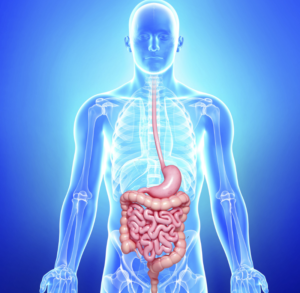Section 6: Digestive System

Anatomy and Physiology
The digestive system is a complex network of organs, including the mouth, esophagus, stomach, small and large intestines, liver, and pancreas, working together to process and absorb nutrients from the food we consume. Mechanical and chemical processes break down food into smaller components, facilitating nutrient extraction and waste elimination.
Importance to Overall Health
The digestive system is central to overall health, playing a vital role in nutrient absorption, energy production, and immune function. Efficient digestion ensures the breakdown of food into nutrients that can be utilized by the body, supporting growth, repair, and maintenance of tissues. A healthy digestive system contributes to a balanced microbiome, optimizing the body’s ability to defend against pathogens and absorb essential nutrients.
Dysfunction
Digestive dysfunction can manifest as conditions like irritable bowel syndrome (IBS), inflammatory bowel disease (IBD), and malabsorption disorders. Factors such as poor diet, stress, and imbalances in gut bacteria can contribute to digestive issues. Dysfunction may lead to symptoms like bloating, constipation, diarrhea, and nutrient deficiencies.
Nutritional Component
Key functional pathways involve the action of digestive enzymes, the maintenance of a healthy gut microbiome, and the absorption of essential nutrients.
- Digestive Enzymes: Enzymes such as amylase, lipase, and protease facilitate the breakdown of carbohydrates, fats, and proteins, respectively. These enzymes are produced by various organs, including the pancreas and small intestine.
- Probiotics: Beneficial bacteria in the gut, known as probiotics, contribute to the fermentation of undigested carbohydrates and the synthesis of certain vitamins. They also play a role in maintaining a balanced immune system.
- Nutrient Absorption: Nutrients are absorbed in the small intestine, including amino acids, fatty acids, and glucose. Vitamins and minerals undergo specific transport mechanisms for absorption.
Science Behind Nutritional Influence
Nutrients and dietary choices significantly impact the nutritional biochemistry of the digestive system:
- Digestive Enzymes: Foods rich in enzymes, such as papaya and pineapple, can support the digestive process, especially in individuals with enzyme deficiencies.
- L-Glutamine: An amino acid that supports the integrity of the intestinal lining, L-glutamine may aid in conditions like leaky gut.
- Fiber: Helps maintain regular bowel movements and supports overall digestive health.
Supplements
Explore the potential benefits of glandular supplements tailored to your individual health profile by setting up a free 10 minute call with Dr. Kneessi. Otherwise here are some of the most common supplement recommendations for supporting this system.
- Probiotics: Support a healthy balance of gut bacteria, aiding digestion and immune function.
- Digestive Enzymes: Assist in breaking down nutrients for better absorption.
- Peppermint Oil: Known for its potential to alleviate symptoms of irritable bowel syndrome (IBS).
- L-Glutamine: Supports the integrity of the intestinal lining and may aid in conditions like leaky gut.
- Fiber Supplement: Helps maintain regular bowel movements and supports overall digestive health.
These supplements are chosen to promote a healthy digestive system. It’s advisable to consult with a healthcare professional, particularly for individuals with digestive disorders, to ensure that the supplements align with individual health needs and do not pose risks of interactions.




